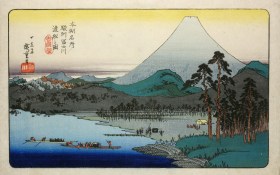Greg Ward is a long-standing Rough Guides stalwart and author of Rough Guides to the USA, Hawaii and France, among others. He’s currently taking time off to pursue other writing projects.
What do you do all day?
It all depends whether I’m on the road or not, writing or updating one of my guidebooks. If I’m travelling, I work really long hours, getting up before 6am and rushing around all day – there’s always so much to do, and so little time, and because I have to write about everything, I have to do stuff that wouldn’t normally appeal to me. And as I take photos too, early morning and sunset are always crucial times to try to be somewhere photogenic. If I’m at home, on the other hand, I lead a more desultory life, with an ongoing struggle to discipline myself to sit in front of my computer, writing endlessly and checking websites, sorting through photos, preparing maps, or whatever.
What are you doing today?
I’m not too busy today, I’m putting the finishing touches to a newspaper article about a guy I met in Hawaii.
What’s the best thing about your job?
It has to be the travel really, if I went off that then it wouldn’t be worth doing. Intellectually, I love learning about new places and cultures; emotionally, I love setting off in the early morning, tanked up on coffee, with no idea where I’m going to end up.
And the worst thing?
To make a living from writing guide books, you have really to specialize in particular destinations, which means rather than endless world’s-your-oyster globetrotting you tend to go to the same places over and over again. And at home, as for any writer, it’s the isolation.
How did you get into it?
After doing an arts degree, I retrained in computer science, where the lectures would start with phrases like “Let’s say you work in a bank…” By the last day of the course, I’d realised that I’d rather to do anything than work with computers, so I used the college computers to write letters to loads of publishers to say that I was supposedly writing a book about a part of Spain I knew well. By pure luck, my letter reached a guy at the then-new Rough Guides who also loved that part of Spain; I never did write that book, but the contact was made. Rough Guides went from strength to strength, and I went along for the ride. Most of the other publishers I wrote to have long since disappeared. I’d have been just as thrilled to write for them, so it was pure luck I made the link with the one that survived. And I did end up using my computer skills after all, as a few years later I set up Rough Guides’ desktop publishing operations.
Who’s been the biggest influence on you, career-wise?
I guess it would have to be Mark Ellingham, the original founder of Rough Guides, who’s a great ideas man.
What do you think makes you good at your job?
I like to think I’m a good writer, good at organising material, telling stories clearly, and communicating my enthusiasms. But I’ve been an editor for a long time as well, and it’s very clear to me that all sorts of people can be good at writing, but the ones who last are the ones who deliver the work when they say they’re going to, in a fully finished form, to the right length.
What’s been your biggest achievement in your career so far?
I’m very proud of having written a good detailed book on the history of the USA in a freakishly short time, but that’s more of an oddity than a totally satisfying achievement. When you write guide books you’re very aware of your competition, and that you’re competing with half a dozen rivals from the other major companies, so I think my finest achievement is my Rough Guide: Southwest USA. I’m totally fascinated by the desert lands, and I think mine is the best guide there is to the region; and I’m proud of having taken the photos for it too.
Any advice for anyone hoping to work in travel writing?
These days, anyone can travel, so no publisher is going to be particularly interested in the mere fact that you’ve been somewhere. What they’re looking for is your ability to write about it, with an awareness that not all your readers will share the same tastes or opinions as you. You’ll also have to accept that you won’t earn very much, at first at least.
What guidebooks do you use when you go travelling?
To tell the truth, there are times when I love to go somewhere and take no interest in it whatsoever, so I don’t need a guidebook. When I travel somewhere that I do want to learn more about, I generally use the relevant Rough Guide, though for specific listings, of hotels and restaurants, I’ll also use Frommer’s guides in North America, and the Routard Guides in France. I like the Cadogan guides in Europe too, and I enjoy the occasional Insight Guide. I’m very familiar with the other major guidebook series, of course, and I’ve worked for several of them, so there are some I have no respect for, but I’ll say no more than that.
Where would you like to go from here, career-wise?
I’ve been writing about Hawaii for years, so I’d like to get to know, and write about, some of the other Pacific islands. I’d also like to develop my photography a bit more. And I’m feeling restricted by the fact that you can’t use the first person in guide books, so I’d like to write a more personal form of nonfiction, though not necessarily travel-related.
If you could have a complete career change and do something else, what would you go for?
I’ve done a number of courses training to be a clown, so it would be fun to be a performer of some kind instead – something that offered a bit more direct communication that sitting alone at a computer.




